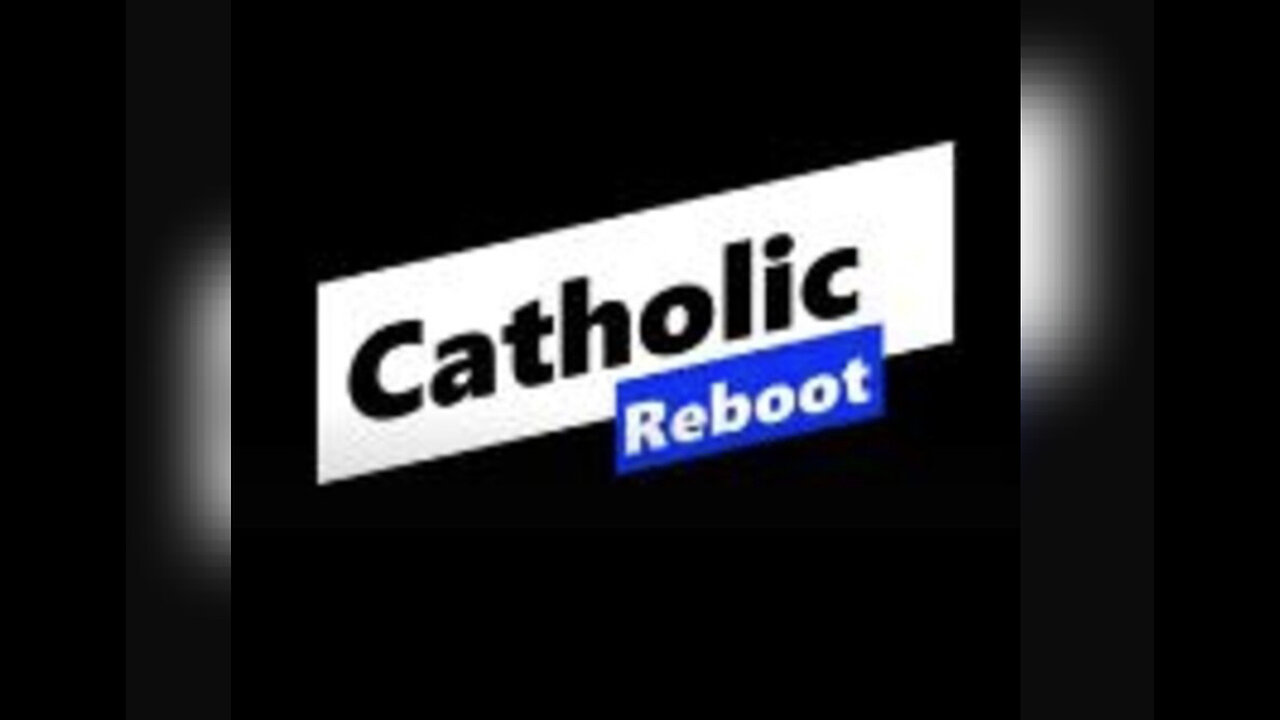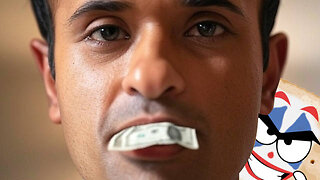Premium Only Content

Episode 2270: Straining Forward in Faith - Morning Episode
We’ll be delving into two powerful quotes, one from St. Paul and another from C. S. Lewis, as well as a pivotal scripture reading from the Gospel of Matthew. Let’s embark on this journey together and discover how these timeless words can shape our path toward holiness.
St. Paul’s Call to Press Onward
"Brethren, I do not consider that I have made it my own; but one thing I do, forgetting what lies behind and straining forward to what lies ahead, I press on toward the goal for the prize of the upward call of God in Christ Jesus." — St. Paul (Philippians 3:13-14)
St. Paul’s words resonate deeply within the Christian heart, calling us to a relentless pursuit of holiness. This passage from Philippians emphasizes the importance of perseverance and forward momentum in our spiritual lives. Paul acknowledges his own imperfections and the ongoing nature of his journey towards Christ. This humility is a crucial aspect of our faith; recognizing that we are not yet perfected allows us to continually strive for greater union with God.
In a traditional Catholic perspective, this "upward call" represents the sanctification process, where each day presents an opportunity to grow in virtue and grace. The sacramental life of the Church supports this journey. Through the frequent reception of the Eucharist and Reconciliation, we are continually renewed and strengthened to press on toward our heavenly goal. Paul’s exhortation reminds us that we must let go of past failures and sins, trusting in God’s mercy and focusing on the promise of eternal life.
C. S. Lewis on the Power of Choice
"People often think of Christian morality as a kind of bargain in which God says, ‘If you keep a lot of rules I’ll reward you, and if you don’t I’ll do the other thing.’ I do not think that is the best way of looking at it. I would much rather say that every time you make a choice you are turning the central part of you, the part of you that chooses, into something a little different from what it was before. And taking your life as a whole, with all your innumerable choices, all your life long you are slowly turning this central thing either into a heavenly creature or into a hellish creature: either into a creature that is in harmony with God, and with other creatures, and with itself, or else into one that is in a state of war and hatred with God, and with its fellow-creatures, and with itself. To be the one kind of creature is heaven: that is, it is joy and peace and knowledge and power. To be the other means madness, horror, idiocy, rage, impotence, and eternal loneliness. Each of us at this moment is progressing to the one state or the other." C. S. Lewis
C. S. Lewis, in his profound way, articulates the transformative power of our choices. Rather than viewing Christian morality as a mere set of rules, he challenges us to see it as a dynamic process of becoming. Every decision we make shapes our souls, turning us either toward God or away from Him.
From a traditional Catholic perspective, this aligns perfectly with the concept of free will and the moral theology that underscores our faith. Our choices have eternal consequences, and through them, we participate in our own sanctification. The Catechism of the Catholic Church teaches us that our moral actions are rooted in our freedom and are essential in shaping our character and destiny.
Lewis’s insight reminds us that daily life is a battlefield for our souls. The choices we make, whether seemingly small or significant, accumulate and steer us towards either sanctity or sin. It’s a powerful reminder to remain vigilant and intentional in our actions, always seeking to align ourselves with God’s will.
The Confession of Peter
"[Jesus] asked his disciples, 'Who do men say that the Son of man is?' And they said, 'Some say John the Baptist, others say Eli′jah, and others Jeremiah or one of the prophets.' He said to them, 'But who do you say that I am?' Simon Peter replied, 'You are the Christ, the Son of the living God.' And Jesus answered him, 'Blessed are you, Simon Bar-Jona! For flesh and blood has not revealed this to you, but my Father who is in heaven. And I tell you, you are Peter, and on this rock I will build my church, and the powers of death shall not prevail against it. I will give you the keys of the kingdom of heaven, and whatever you bind on earth shall be bound in heaven, and whatever you loose on earth shall be loosed in heaven.'" — Matthew 16:15-19
In this profound moment, Peter’s declaration of faith is met with Jesus’s affirmation of his foundational role in the Church. This passage is pivotal for understanding the Catholic teaching on the papacy and the authority given to Peter and his successors.
From a traditional Catholic viewpoint, Peter’s confession is not merely a personal revelation but a divine truth revealed by God. Jesus’s response underscores the unique role of Peter, making him the rock upon which the Church is built. This establishes the apostolic succession and the enduring authority of the Pope, who serves as the spiritual leader and custodian of Church doctrine.
The "keys of the kingdom of heaven" symbolize the authority to govern the house of God, which is the Church. This authority includes binding and loosing, terms that refer to the ability to make doctrinal decisions and to forgive sins, reflecting the Church’s teaching on the sacrament of Confession.
In our own lives, Peter’s declaration invites us to examine our personal faith in Jesus. Do we truly recognize Him as the Christ, the Son of the living God? And are we willing to build our lives upon this truth, allowing Christ to be the foundation of all we do?
Conclusion:
As we conclude today’s episode, let’s reflect on the powerful messages we’ve explored. St. Paul encourages us to press on toward our heavenly goal, letting go of the past and striving forward. C. S. Lewis challenges us to recognize the transformative power of our daily choices, shaping us into creatures destined for heaven or hell. And the Gospel of Matthew reminds us of the foundational role of faith and the authority Christ has given to His Church.
May these reflections inspire you to live with greater intentionality and faith, always seeking to align your will with God’s and to press on towards the upward call in Christ Jesus. Thank you for joining us on "Tradition and Truth." Until next time, may God bless you and keep you on the path to holiness.
-
 15:50
15:50
Degenerate Jay
1 day ago $1.28 earnedJames Bond Is Being Ruined By Amazon? Make Him A Black Gay Woman?
19.7K9 -
 15:18
15:18
DeVory Darkins
1 day ago $12.04 earnedTrump Drops NIGHTMARE Warning on Joe Biden
36K43 -
 36:13
36:13
The Why Files
1 month agoAlien Implants Vol. 1: Devil’s Den UFO Encounter: What Was Found Inside Terry Lovelace?
67.6K39 -
 9:03
9:03
Alabama Arsenal
1 day ago $0.36 earnedAAC HUB 2K | Modern Features, Iconic Classic Looks
9.7K1 -
 13:49
13:49
Dermatologist Dr. Dustin Portela
2 days ago $0.67 earnedDermatologist Reveals the Worst Things To Do To Your Skin
7.96K1 -
 1:02:24
1:02:24
PMG
23 hours ago $0.22 earned"Hannah Faulkner and Jamie Villamor | DEFEND, INSPIRE, INFLUENCE"
6.56K -
 44:27
44:27
BIG NEM
15 hours agoWOULD YOU RATHER? Live Stream
4.46K -
 4:23:49
4:23:49
FreshandFit
16 hours agoIsrael v Palestine Debate! Respect A Man If He Says No Or Yes To A Girl's Trip?
196K220 -
 2:05:33
2:05:33
TheSaltyCracker
18 hours agoTech Bros try to Hijack MAGA ReeEEeE Stream 12-27-24
331K586 -
 2:01:25
2:01:25
Roseanne Barr
23 hours ago $48.81 earnedJeff Dye | The Roseanne Barr Podcast #80
153K70